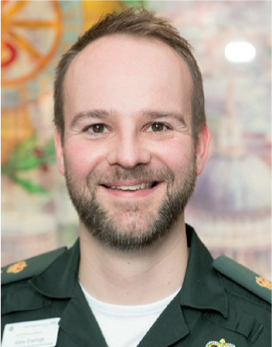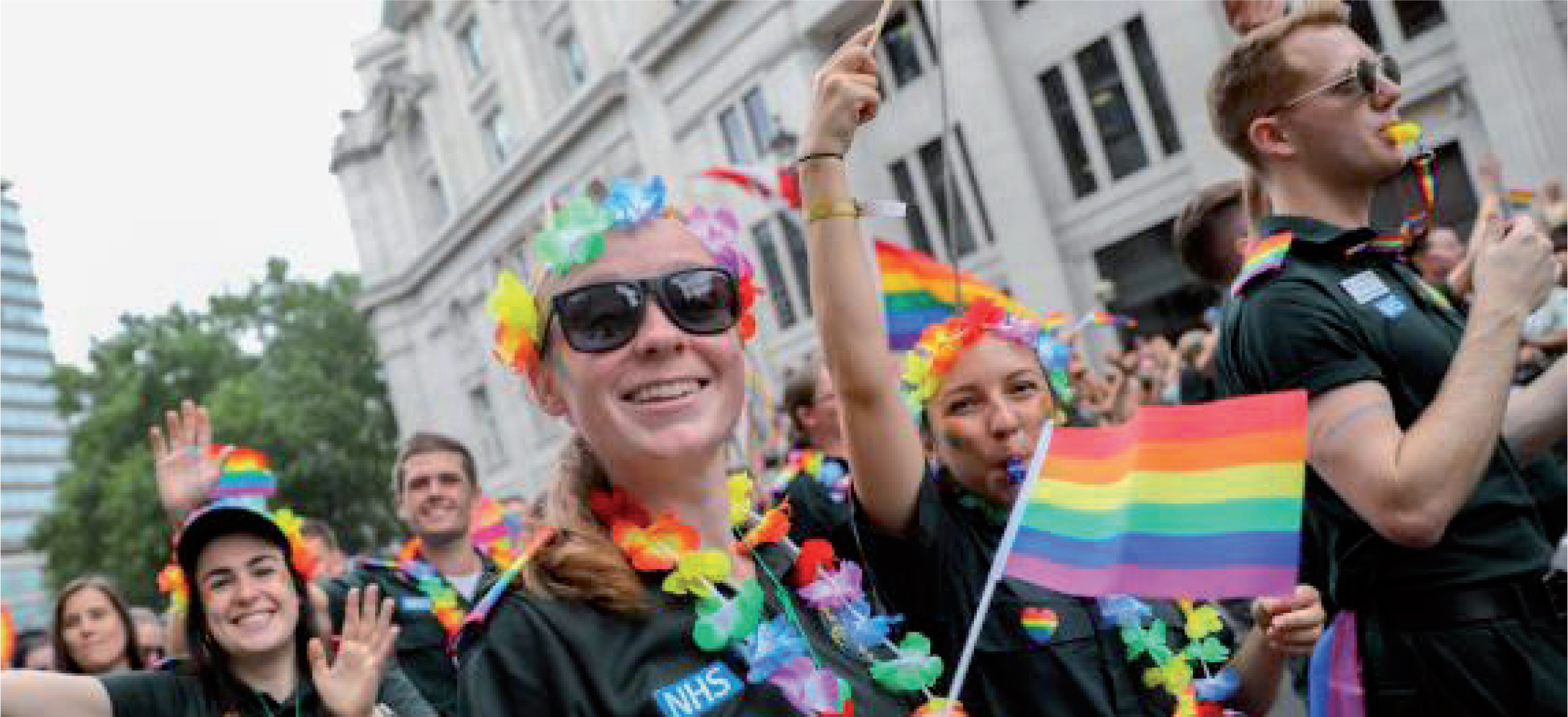
This year's Pride London Festival marked our largest staff turnout since we started taking part around 10 years ago. Almost 60 staff represented London Ambulance Service (LAS), all in their own time.
It was a great day and those from our Service marching in the parade came from a variety of roles and clinical grades. This included staff from our control rooms and some who had just completed basic training in our education centres.
Pride is an opportunity for us to celebrate our staff as individuals and for them to be able to literally show ‘pride’ in who they are. Those taking part can proudly wear their uniform knowing that the Service, and wider NHS, are organisations that are supportive of them.
However, the origins of Pride have always been about protest and, in a modern LGBT staff network, there are things we have to remember: we have a generation of staff who have, thankfully, generally not experienced the levels of oppression and exclusion that LGBT people who have gone before us have. But recent unfortunate events in the news, and in London in particular, have reminded us all that there is very much a reason why it is essential that the lives of LGBT staff and patients need to be proudly visible and have their voices heard. So for us, it's about keeping that spirit of protest alive. This year, the theme for Pride in London was #PrideJubilee to honour 50 years since the Stonewall riots of 1969 which sparked the modern pride movement—so we also have a duty to educate all of our staff about that and what it means.
The parade photos tell their own story: the atmosphere was magical, and for me as a Co-Chair of the LAS LGBT Network, the reward is seeing how much our staff enjoyed themselves.
Our LGBT Network was created to provide a platform for our staff so they can be acknowledged, represented, and supported. But the Network doesn't just spring to life for the pride parade. We work hard throughout the year so our Service can continue to see the benefits and the difference we are making to our staff and patients across London.
We do this through our internal communication channels and also through our dedicated social media pages on Twitter and Facebook. This could be by keeping people informed of the latest LGBT healthcare news and what it might mean to them, or by championing approaches to improve patient care, such as how to best care for Trans patients; it's incredibly varied!
A key priority for the Network is to make improvements to help our staff and patients. It doesn't matter what role you play in our Service, there is always something the Network can do to support your understanding and education and provide welfare signposting where required.
Recently we recruited a cohort of ‘Network Representatives’ to enable us to form a Committee. LAS is spread over 70 sites, so by having these reps, we are now able to collectively reach out to staff more effectively, and target areas of the workforce who might otherwise have been under-represented.
This also means we will be able to better understand the local needs of the people we care for. It goes without saying that London is an incredibly diverse place to work, so helping our staff to better understand the communities in which they work is a step towards improved care and patient experience.
The Network is really strong at championing mental health support and guidance for our staff, and we aim to provide continuing professional development (CPD). We are also working on some other innovative ways to improve patient care and patient experience—watch this space, we can't give away too much just yet!
Within the LAS Network, we hold two national portfolios of work with the National Ambulance LGBT Network. On a personal level, it's great that I am able to work collaboratively across the other UK ambulance trusts to drive improvements in patient care, hopefully on a grand scale.
Planning and Development Manager at Yorkshire Ambulance Service and Chair of the National LGBT Ambulance Network, Alistair Gunn, said about the importance of the national network:
‘When we set up the National Ambulance LGBT Network in 2015, we wanted it to be an organisation that really made a difference to patients and their staff.
‘In fact, our three objectives at that point were providing excellent care to patients, supporting our staff and being visible in communities. We have certainly covered a lot of ground in the first 4 years, holding three successful conferences, developing a number of resources and improving the LGBT Networks in each Trust.
‘This year alone we have seen more ambulance staff attend a greater number of Pride events than ever before, all fully supported by their Trusts and embracing the rainbow star that is the ambulance LGBT symbol.
‘I think the increase in visibility and support for LGBT people has reached an all-time high in 2019. Taking part in Pride events gives a very powerful message to the communities we serve, that our services are inclusive and there for everyone.
‘We also want our LGBT staff to know that we are proud of them as much as anyone else, and one of the added benefits of having a national network is seeing people cross boundaries and taking part in Pride events in neighbouring services.’

One way we are helping to break down barriers at LAS is through the launch of our bespoke LGBT Network lanyards for staff in the rainbow, Trans and bi flag colours. They've been incredibly popular and it's been a great way for staff right across the organisation to show their support.
Last year we were honoured to team up with Chris Pointon, husband of the late Dr Kate Granger, to launch our staff #HelloMyNameIs badges. #HelloMyNameIs is an initiative to encourage and remind health professionals about the importance of introductions for patients. Our new badges have an additional small rainbow symbol—another optional way for staff to show to patients, or their colleagues, that they can open up or approach them about LGBT issues.
In terms of what we have done to improve patient care, all you need to do is look at the awareness we are bringing to caring for Trans patients, which is being led by the National Ambulance LGBT Network. Our aspiration is that every person who wears a green uniform will be able to carry one of the Trans Z-Cards. These cards have been designed with the aim to support staff when caring for Trans patients, on the phone or on scene, with useful explanations and examples of best practice.
We are also looking at how we can signpost clinicians to bespoke advice to assist them on scene, which could be information relating to HIV care (of course not just an LGBT issue) and specialist services for those who are victims of sexual violence, because we know LGBT people can sometimes be fearful of accessing healthcare.
Our LGBT Network also engages with the LAS Patients' Forum, which is key to us rightly being held to account, and also for information sharing and cooperation. We also report to our ‘Equality and Inclusion Committee’.
Challenging behaviours and attitudes within the Service is continually important. The Service is committed to supporting staff to have the confidence to call out ‘banter’ and any other inappropriate behaviour, both through our Freedom to Speak Up Network and our ‘It's OK to challenge’ campaign.
LGBT awareness has come incredibly far—and our modern workforce rightly demands it. Being an NHS ambulance employee is no longer just a ‘job for the boys’ and that's being reflected in the different people who work here including LGBT staff. Pride is also incredibly important in terms of recruitment to the ambulance sector. LGBT people who see others like them, doing certain jobs, are then empowered to realise that they ‘can do’.
Anyone can do this job if you apply yourself and work hard, and I'm pleased to say that poor attitudes are being challenged and stamped out. There will always be more to do, but symbolic moments such as being able to raise the rainbow flag above our headquarters in recognition of Pride month and our participation in Pride London highlight the huge milestones we have overcome already.

